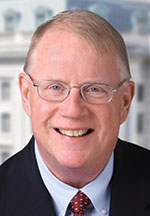Reflection / Daniel Conway
Bishops debate how to teach faithful citizenship today
 For several years, the American bishops have relied on a 2007 teaching document titled “Forming Consciences for Faithful Citizenship: A Call to Political Responsibility,” which contains basic Church teaching on contemporary social and political matters, and which attempts to guide Catholics in the formation of conscience.
For several years, the American bishops have relied on a 2007 teaching document titled “Forming Consciences for Faithful Citizenship: A Call to Political Responsibility,” which contains basic Church teaching on contemporary social and political matters, and which attempts to guide Catholics in the formation of conscience.
Because of the number of pressing issues and the need to present Church teaching in some depth, “Forming Consciences for Faithful Citizenship” is a comparatively lengthy document.
As most bishops see it, this document is primarily intended to help pastors, teachers and the staff of bishops’ conferences understand, teach and advocate for the Church’s positions on matters of law and public policy. The document’s length and its uninspiring style of presentation make it less than suitable (some say “cumbersome”) for public consumption.
Most bishops agree that new instruments of communication are needed. At their recent meeting in Fort Lauderdale, a majority of the bishops (77 percent) voted to accept a proposal prepared by a working group chaired by Los Angeles Archbishop Jose Gomez, who currently serves as the U.S. Conference of Catholic Bishops’ (USCCB) vice president.
This proposal, which was accepted following an unexpectedly vigorous debate, calls for the production of a short letter to inspire prayer and action regarding public life, and a short video and other secondary resources to complement rather than to replace “Forming Consciences for Faithful Citizenship” and to apply the teachings of Pope Francis to our day.
A small but influential number of bishops (41 out of the 185 voting prelates) opposed the proposal. Based on comments from Chicago Cardinal Blasé J. Cupich, Cardinal Joseph W. Tobin of Newark, N.J., (former archbishop of Indianapolis), Bishop Christopher J. Coyne of Burlington, Vt. (former auxiliary bishop of Indianapolis) and several others who spoke against the proposal, they believe it is not sufficient to supplement the existing document which was last revised in 2015.
These bishops called for an entirely new document reflecting what Cardinal Cupich called the “new body of teaching” from Pope Francis on issues, including climate change, poverty and immigration.
During the meeting, Cardinal Tobin expressed his grave concern over what he calls the “chasm between faith and life” in which faith has been privatized.
When asked following the bishops’ meeting to explain why he thinks it’s important to revise or replace “Forming Consciences for Faithful Citizenship” with new content, Cardinal Tobin said: “Most bishops agree that a variety of communications [video, podcasts, inspirational messages, etc.] are needed to reach today’s diverse audiences, but all these need to be grounded in a source document that presents Church teaching with the newness and pastoral insights of Pope Francis. ‘Forming Consciences for Faithful Citizenship’ served us well in the past, but it was not written to address today’s very different political environment.”
Much has changed since the 2015 revision of “Forming Consciences for Faithful Citizenship.” The most obvious change is in the vulgarity and incivility of political discourse, but there are also seismic shifts in the way public policies are being addressed by the executive, legislative and judicial branches of our government.
Whereas in 2015, the threats to the Church’s pro-life agenda and religious freedom were a clear and present danger, policies established by the new administration have lessened these threats considerably (while not completely eliminating them).
At the same time, although our immigration system has been badly broken for many years now, the intensity of today’s conflict and the blatantly racist overtones have gone way beyond acceptable levels of disagreement among Americans seeking to make prudential judgments about our nation’s best interests.
Those bishops who argue for a new statement on the formation of conscience in the radically different political and cultural environment today say they are following the lead of Pope Francis.
During his five years as shepherd of the universal Church, Pope Francis has been emphatic in pointing to those issues that he believes demand our full and undivided attention. “Faith must be lived,” he tells us. “It cannot be just words.” And Pope Francis insists that the Church’s priority must always be the poor, the vulnerable and the marginalized.
“Our defense of the innocent unborn, for example, needs to be clear, firm and passionate, for at stake is the dignity of a human life, which is always sacred and demands love for each person, regardless of his or her stage of development,” he writes. “Equally sacred, however, are the lives of the poor, those already born, the destitute, the abandoned and the underprivileged, the vulnerable infirm and elderly exposed to covert euthanasia, the victims of human trafficking, new forms of slavery, and every form of rejection. (“Gaudete et Exsultate,” #101).
Given a choice, missionary disciples of Jesus Christ must choose the way of the cross over more comfortable options. Whether in a revised form or completely replaced, “Forming Consciences for Faithful Citizenship” must make this Gospel teaching perfectly clear.
(Daniel Conway is a member of The Criterion’s editorial committee.) †
 For several years, the American bishops have relied on a 2007 teaching document titled “Forming Consciences for Faithful Citizenship: A Call to Political Responsibility,” which contains basic Church teaching on contemporary social and political matters, and which attempts to guide Catholics in the formation of conscience.
For several years, the American bishops have relied on a 2007 teaching document titled “Forming Consciences for Faithful Citizenship: A Call to Political Responsibility,” which contains basic Church teaching on contemporary social and political matters, and which attempts to guide Catholics in the formation of conscience.